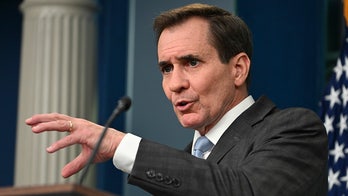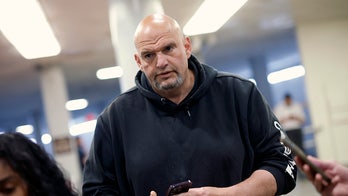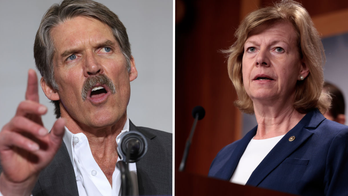WASHINGTON -- The day after Congress raised America's debt ceiling above $14 trillion -- potentially adding another $6,000 in debt to every man, woman and child -- a surprisingly upbeat January jobs report that showed unemployment dipping below 10 percent prompted President Obama to declare that "we are climbing out of the huge hole that we found ourselves in."
Obama assessment was partly based on a report out Friday that showed the unemployment rate dropping in January from 10 to 9.7 percent, while employers shed only 20,000 jobs.
But it's not all roses, as the Labor Department revised its past employment estimates to show that job losses from the Great Recession have been much worse than previously state. The economy has shed 8.4 million jobs since the downturn began in December 2007, up from a previous figure of 7.2 million. That's the most jobs lost in any recession, as a percent of total employment, since World War II.
The figure for November was revised higher, however, to show a gain of 64,000 jobs. That was initially reported as a gain of 4,000.
Obama, speaking Friday at a small business in a Washington suburb, took pains not to overstate the gains detailed in the new government report.
"These numbers, while positive, are a cause for hope but not celebration because far too many of our of neighbors, and friends and family are out of work," he said.
The unemployment rate dropped because a survey of households found the number of employed Americans rose by 541,000, the Labor Department said Friday. The job losses are calculated from a separate survey of employers.
Obama's economic adviser, Christina Romer, responded to the jobs report with cautious optimism.
"Even as today's numbers contain signs of the beginning of recovery, they are also a reminder of how far we still have to go to return the economy to robust health and full employment," Romer wrote on the White House blog.
"There will likely be bumps in the road ahead," she continued. "The monthly employment and unemployment numbers are volatile and subject to substantial revision. Therefore, it is important not to read too much into any one monthly report, positive or negative."
Much of January's report offers hope that employers are starting to reverse course and may start adding jobs soon. Aside from November's gain, January's job losses were the smallest since the recession began and are down from the huge loss of 779,000 jobs in January 2009.
But Republicans weren't impressed, as they focused on the 20,000 jobs lost last month.
"Washington Democrats promised that the trillion-dollar 'stimulus' would create jobs 'immediately,' keep the unemployment rate from going above eight percent and that 90 percent of the jobs created would be private-sector jobs," House Minority Leader John Boehner said in a written statement.
"None of that has occurred, and the Obama administration's job-killing policies are only making matters worse," he said.
Rep. Eric Cantor, R-Va., the No. 2 Republican in the House, charged Obama and Democratic leaders with perpetuating "an environment of uncertainty with the threat of even more mandates and red tape, skyrocketing deficits, and tax increases that prevent job creation."
The manufacturing sector added jobs for the first time since January 2007. Its gain of 11,000 jobs was the most since April 2006.
Retailers added 42,100 jobs, the most since November 2007, before the recession began. Temporary help services gained 52,000 jobs, its fourth month of gains. That could signal future hiring, as employers usually hire temp workers before permanent ones.
The average work week increased to 33.3 hours, from 33.2. That indicates employers are increasing hours for their current workers, a step that usually precedes new hiring.
The number of part-time workers who want full-time work, but can't find it, fell by almost 1 million. That lowered the "underemployment" rate, which also includes discouraged workers, to 16.5 percent from 17.3 percent.
The federal government has begun hiring workers to perform the 2010 census, which added 9,000 jobs. That process could add as many as 1.2 million jobs this year, though they will all be temporary.
But job cuts at the state and local levels canceled out those gains, as government employment fell by 8,000.
The construction industry lost more jobs than other sector, dropping 75,000. Most of that loss came from the commercial building sector, the department said.
Still, jobs remain scarce even as the economy is recovering: Gross domestic product, the broadest measure of the nation's output, has risen for two straight quarters. GDP rose by 5.7 percent in the October-December quarter, the fastest pace in six years.
Many economists say businesses are reluctant to add workers because it's not clear whether the recovery will continue once government stimulus measures, such as tax credits for home buyers, fade this spring.
The debate over health care reform and the scheduled expiration of some Bush administration tax cuts at the end of this year may also hold back some employers, many economists said.
"Until some of these uncertainties from Washington get cleared up, businesses, particularly small businesses, are going to be loath to do any additional hiring," said Hank Smith, chief investment officer at Haverford Investments.
High unemployment could restrain consumer spending, which has led most recoveries in the past. That's why many economists think the current rebound will be weak.
Public concern about persistent unemployment has forced Obama and members of Congress to shift their attention to jobs and the economy and away from health care reform. The Senate will begin working Monday on legislation that would give companies a tax break for hiring new workers, Majority Leader Harry Reid said Thursday.
The budget plan Obama released this week projects unemployment will still be very high -- 9.8 percent -- by the end of this year.
The Associated Press contributed to this report.




